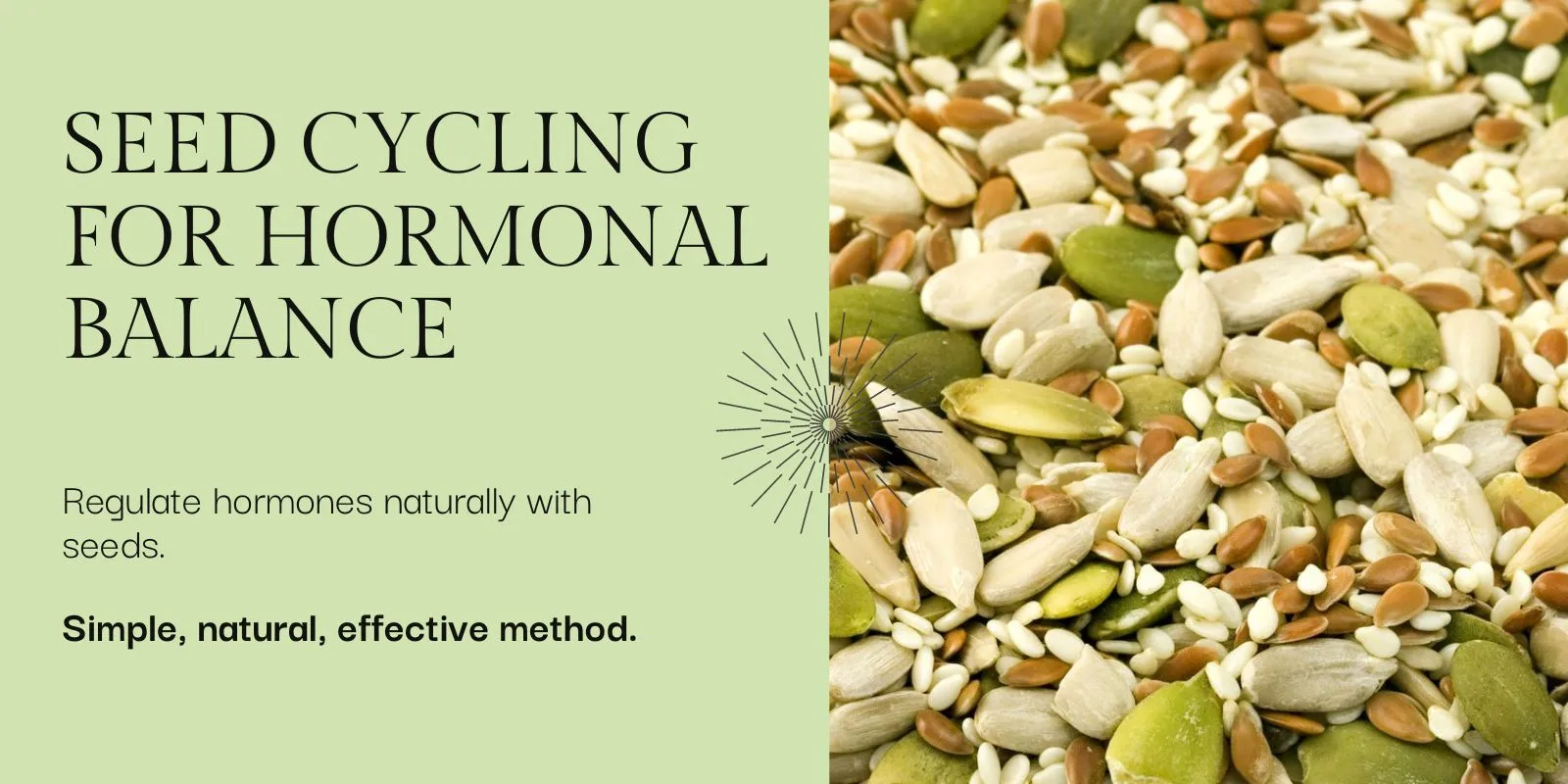
Bloom with Balance Seed Cycling Secrets for Hormonal Harmony

Introduction:
Are you tired of battling hormonal imbalances? Experiencing irregular periods, pesky PMS, or fertility struggles? Seed cycling might be the natural solution you’ve been searching for!
Seed cycling is a holistic approach gaining popularity in the realm of natural wellness, particularly for women’s health. It involves incorporating specific seeds into your diet at different phases of your menstrual cycle to promote hormonal balance. This ancient practice harnesses the nutritional power of seeds to support the body’s natural hormonal fluctuations, offering a gentle and sustainable method for addressing hormonal imbalances. Let’s delve deeper into the concept of seed cycling, its benefits, and how you can integrate it into your routine for improved well-being.
How it Works:
Your menstrual cycle has two main phases: the follicular phase (days 1-14) and the luteal phase (days 15-period). Seed cycling utilizes the unique properties of certain seeds to support your body during each phase.7
Follicular Phase (Days 1-14): Flax seeds and pumpkin seeds are your follicular phase friends. These powerhouses are rich in lignans and zinc, which are thought to help regulate estrogen production and support healthy egg development.
-
- Lignans: These plant compounds in flaxseeds may help regulate estrogenic levels [source: lignans and estrogen metabolism].
- Zinc: Rich in pumpkin seeds, zinc is crucial for egg development [source: zinc deficiency and reproductive health].
Luteal Phase (Days 15-Period): Sunflower seeds and sesame seeds take center stage during this phase. They’re packed with vitamin E and magnesium, which are believed to support progesterone production and a healthy uterine lining.
-
- Vitamin E: Found abundantly in sunflower seeds, vitamin E is believed to aid progesterone production [source: vitamin E and hormonal function].
- Magnesium: Sesame seeds boast magnesium, which can help regulate menstrual cycles [source: magnesium deficiency and menstrual cycle].
Benefits of Seed Cycling:
- Hormonal Balance: Seeds contain phytoestrogens and lignans, plant compounds that can mimic estrogenic in the body, helping to balance hormone levels naturally.
- Menstrual Regularity: By supporting hormone production and regulation, seed cycling may help promote regular menstrual cycles and alleviate symptoms of hormonal imbalance such as irregular periods, PMS, and menstrual cramps.
- Fertility Support: Balanced hormones are essential for reproductive health, and seed cycling may support fertility by optimizing hormonal function.
- Mood and Energy: Hormonal imbalances can impact mood and energy levels. Seed cycling aims to stabilize hormones, potentially leading to improved mood and energy throughout the menstrual cycle.
- Digestive Health: Seeds are rich in fiber, which supports healthy digestion and may help alleviate symptoms of bloating and constipation commonly associated with hormonal fluctuations.
How to Incorporate Seed Cycling into Your Routine:
- Track Your Cycle: Start by tracking your menstrual cycle to determine the follicular and luteal phases.
- Choose High-Quality Seeds: Opt for organic, raw seeds whenever possible to ensure you’re getting the most nutritional benefits.
- Seed Rotation: Consume 1-2 tablespoons each of flax seeds and pumpkin seeds during the follicular phase, and 1-2 tablespoons each of sesame seeds and sunflower seeds during the luteal phase. Seeds can be eaten raw, ground, or added to smoothies, salads, or oatmeal.
- Be Consistent: Consistency is key with seed cycling. Aim to incorporate seeds into your daily diet throughout each phase of your menstrual cycle.
- Monitor and Adjust: Pay attention to how your body responds to seed cycling. You may need to adjust the amounts or types of seeds based on your individual needs and hormone levels.
Conclusion:
Seed cycling offers a natural and accessible way to support hormonal balance and overall well-being. By incorporating nutrient-rich seeds into your diet according to your menstrual cycle, you can harness the power of nature to promote hormonal harmony. Remember to listen to your body, stay consistent, and consult with a healthcare professional if you have any concerns about hormonal imbalances or underlying health conditions. Embrace seed cycling as a gentle yet effective tool on your journey to hormonal health and vitality.
Important Note:
Seed cycling is intended as a complementary approach, not a substitute for medical advice. If you have underlying health concerns or are considering seed cycling for fertility, consult with a doctor or registered dietitian.



 Free Shipping on Order above ₹499/-
Free Shipping on Order above ₹499/- 

